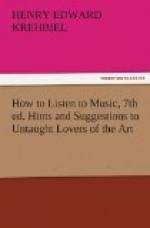[Sidenote: The musician should help to elevate the standard of criticism.]
[Sidenote: A critic must not necessarily be a musician.]
[Sidenote: Pedantry not wanted.]
The musician knows as well as anyone how impossible it is to escape the press, and it is, therefore, his plain duty to seek to raise the standard of its utterances by conceding the rights of the critic and encouraging honesty, fearlessness, impartiality, intelligence, and sympathy wherever he finds them. To this end he must cast away many antiquated and foolish prejudices. He must learn to confess with Wagner, the arch-enemy of criticism, that “blame is much more useful to the artist than praise,” and that “the musician who goes to destruction because he is faulted, deserves destruction.” He must stop the contention that only a musician is entitled to criticise a musician, and without abating one jot of his requirements as to knowledge, sympathy, liberality, broad-mindedness, candor, and incorruptibility on the part of the critic, he must quit the foolish claim that to pronounce upon the excellence of a ragout one must be able to cook it; if he will not go farther he must, at least, go with the elder D’Israeli to the extent of saying that “the talent of judgment may exist separately from the power of execution.” One need not be a composer, but one must be able to feel with a composer before he can discuss his productions as they ought to be discussed. Not all the writers for the press are able to do this; many depend upon effrontery and a copious use of technical phrases to carry them through. The musician, alas! encourages this method whenever he gets a chance; nine times out of ten, when an opportunity to review a composition falls to him, he approaches it on its technical side. Yet music is of all the arts in the world the last that a mere pedant should discuss.
But if not a mere pedant, then neither a mere sentimentalist.
[Sidenote: Intelligence versus emotionalism.]
“If I had to choose between the merits of two classes of hearers, one of whom had an intelligent appreciation of music without feeling emotion; the other an emotional feeling without an intelligent analysis, I should unhesitatingly decide in favor of the intelligent non-emotionalist. And for these reasons: The verdict of the intelligent non-emotionalist would be valuable as far as it goes, but that of the untrained emotionalist is not of the smallest value; his blame and his praise are equally unfounded and empty.”
[Sidenote: Personal equation.]
[Sidenote: Exact criticism.]




